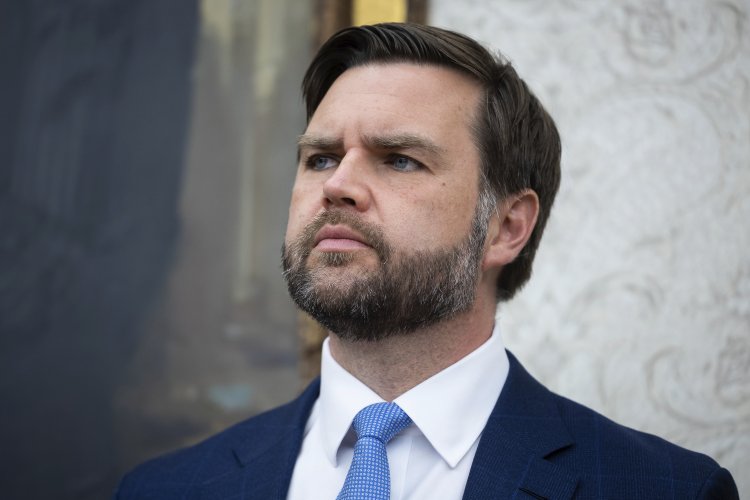Vance asserts Russia is 'asking for too much' to conclude war with Ukraine
During the Munich Leaders Meeting, the vice president expressed that the U.S. is looking for direct dialogue between Ukraine and Russia.

While addressing the Munich Leaders Meeting in Washington, Vance noted that the U.S. is concentrating on a long-term resolution since Russia has dismissed the U.S. proposal for a 30-day ceasefire. According to Moscow, such a temporary halt would not align with its strategic interests as it would allow Ukraine to regroup.
Vance emphasized that Russia would likely need to make concessions, signaling a shift towards a more assertive stance from the Trump administration concerning Russian President Vladimir Putin.
“The Russians are asking for a certain set of requirements, a certain set of concessions in order to end the conflict. We think they’re asking for too much,” Vance stated.
His comments reflect a growing impatience within the White House towards Putin. Recently, President Donald Trump remarked that Putin might be “tapping me along” and indicated a possible resort to sanctions to alter the current dynamics.
“Maybe he doesn’t want to stop the war,” Trump suggested regarding Putin, in a post on his Truth Social platform following a meeting with Ukrainian President Volodymyr Zelenskyy in Rome.
Vance mentioned that Trump is ready to withdraw from the negotiations but refrained from issuing direct threats of sanctions. He outlined that the next step involves getting both Ukraine and Russia to communicate.
“We would like both the Russians and the Ukrainians to actually agree on some basic guidelines for sitting down and talking to one another,” Vance remarked. “That is the next big step we’d like to take.”
Despite recognizing “a big gulf” between the positions of Russia and Ukraine, he stated that he is “not yet a pessimist” regarding the process. He added that it’s “probably impossible” for the U.S. to mediate effectively without some form of direct dialogue between the two parties.
Vance, speaking to a group of senior transatlantic leaders in Washington, adopted a more diplomatic approach compared to his earlier speech at the Munich Security Conference in February. He emphasized the significance of U.S.-European relationships, describing them as being on the “same civilizational team.” The Munich Leaders Meeting is organized by the Munich Security Conference.
Amid palpable tension in the room—filled with critics of Trump and skeptics of his administration’s stance on transatlantic relations—Vance conveyed that he was “having fun” at the conference, humorously noting that his team appeared “very nervous.”
He expressed uncertainty about being invited back after his previous appearance in Munich, where he had confronted European governments over a range of issues, including their disregard for public opinion and failure to manage illegal immigration.
During the Q&A session with Wolfgang Ischinger, former German ambassador to the U.S. and chair of the Munich Security Conference, Vance revisited his earlier controversial statements. While his tone was more conciliatory this time, he reiterated cautionary messages for Europe that he believes apply to the U.S. as well.
“It's not ‘Europe bad, and America good,’” he asserted. “I think that both Europe and the United States, we've gotten a little bit off track, and I'd encourage us all to get back on track together.”
His remarks seemed to alleviate some tensions at the meeting. One attendee, a Western European, confessed, “I came into the speech pretty nervous. I left slightly less nervous.”
Another participant acknowledged the softer tone but pointed out that “there were a lot of questions left unanswered. How many concessions are you willing to offer Russia? If Ukraine can’t join NATO what will you do to prevent future Russian invasions? Because without hard defense commitments to Ukraine we all know it will happen again.”
Others expressed discomfort with Vance’s stance towards Moscow. Under Chatham House Rules, all participants spoke anonymously to promote open dialogue.
“He charmed, he cleaned up from the February speech, he reassured, he made everything okay,” a third participant reflected. “But to come off as somehow neutral between Russia and Ukraine is morally repugnant. One side is the aggressor, one the victim fighting for its survival. Nice speeches can’t change that.”
As Vance spoke, a new public disagreement arose between the United States and Germany over Berlin’s classification of its far-right political party, the AfD, as an extremist group.
Secretary of State Marco Rubio criticized this designation, labeling it “tyranny in disguise” and claiming that the establishment parties’ “deadly open border immigration policies” were truly extremist.
New German Chancellor Friedrich Merz countered that statement, calling it an “absurd observation” in an interview with public broadcaster ZDF.
“I would like to encourage and exhort the American government to leave German domestic politics to Germany and to largely stay out of these partisan considerations,” Merz stated during the interview.
Max Fischer for TROIB News












